Have you ever heard of the saying “there are no free lunches”? I grew up with my father the anesthesiologist saying this over and over to me. Like if you take a medicine, it better be well worth it for all the downsides that come with taking a pharmaceutical. We rarely took Advil! I am thankful for this teaching today. I respect the assistance of medicine and substances like caffeine for the support they can provide, but I make sure to stay within the limits my body can handle and never make a habit/dependency on any of it. I like the connection I have with my body in its natural state so that it can tell me what’s wrong or right. When you band-aid too much you can lose this valuable information.
So this month I want to talk about nutritional ergogenic aids (i.e. “pre-workout” supplements). I first want to say you have no business using ergogenic aids if you don’t first prioritize:
- Wholesome and adequate diet (proper amount of kcals, nutrient dense food most of the time, 5-9 servings of fruits and veggies daily, whole grains, healthy fats, and enough water)
- Adequate sleep (7-9 hrs)
- Stress reduction and mindfulness moments daily
- Balanced workout/training program (cross training and combining stretch, strength, cardio, and recovery)
- Overall health (blood pressure, sugars, lipids, etc. all in balance)
If something is out of balance, stop here and focus on THAT. Not pre-workout substances.
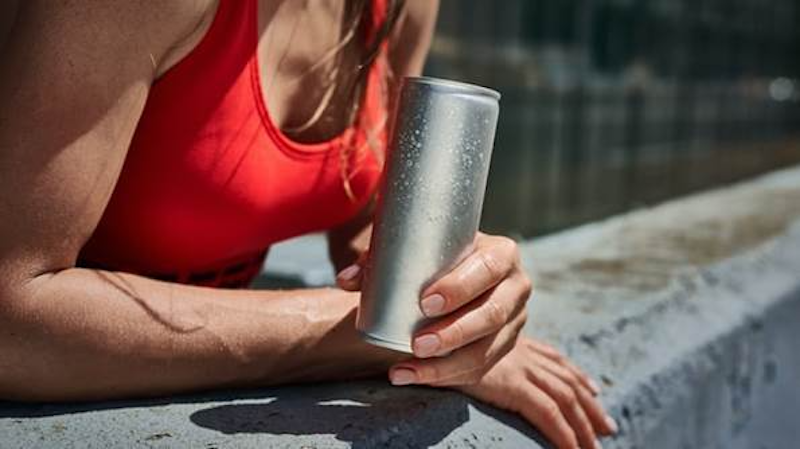
Take a deeper look at some typical pre-workout ingredients and labels, what they do, and how to get SOME of them naturally in your diet:
Do you ever feel like you need a little extra boost to get your daily exercise in? Pre workout drinks and supplements are designed to help you get the most out of your workouts, but buyer beware: many products over-promise and under-deliver.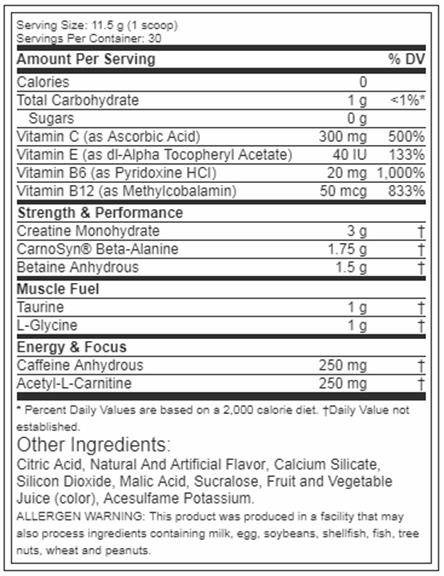
Let’s get one thing straight: the overwhelming majority of supplements are expensive trash (see label above!). Most are not backed by any kind of research and full of fillers, artificial sweeteners, and colors. If you are looking for a fitness-related supplement, I’m guessing that your goal is to be optimally healthy. There’s no reason to load up on a bunch of unnecessary harmful stuff. So before you go clicking away on Amazon ready to add to cart, remind yourself that there are no short cuts in life (like my father was always telling me), especially when it comes to health. You can’t gain muscle by drinking a mountain of protein powder, and you can’t lose weight and keep it off by popping a “fat burner” every day. Sorry guys.
Here is the low down on some examples of ergogenic aids:
Creatine:
Creatine gives you that little extra push during a workout by helping you do those last 2 reps that you couldn’t get before, which in turn increases strength and helps to build muscle. Creatine is naturally produced in the body and stored in your muscles to help produce ATP, your bodies source of fuel. Behind caffeine and protein, it is one of the most popular, effective, and researched sports supplements.
Bottom Line: I don’t recommend taking this because you will retain water (your weight will increase), you could experience GI distress, and stress the kidneys. The water retention with weight increase with a bit of an energy boost may encourage your body to push and pull more weight than it should, leading to excess stress on valuable joints.
Caffeine:
The most common ingredient in pre-workouts is caffeine. That’s because this familiar ergogenic aid has been used by athletes with the hopes of improving endurance, delaying fatigue, and even lowering the rate of perceived exertion (how difficult you perceive the workout to be). For example, several studies show there are benefits of caffeine on strength and power outputs. The optimal dose of caffeine is .9 to 1.4mg per pound of body weight. For example, a 150-pound person would require about 135 to 200mg of caffeine about 20 minutes before a workout. (FYI, that’s less than a small cup of coffee at most cafés.)
Bottom Line: Go for it (under 300mg/day before noon so you don’t get insomnia, and 30-60min prior to your workout) as long as it doesn’t cause jitters and anxiety OR if it’s not working at all. You need to keep the dose inconsistent or skip days if you are not feeling the caffeine anymore.
Branched Chain Amino Acids (BCAAs):
These popular pre-workout ingredients are the building blocks of protein and are meant to protect glycogen stores in the muscles (so you can work out longer), and they may also help with recovery. One study supports the role of BCAAs in recovery and the building of muscular anaerobic power (your body’s ability to generate force). Other research found that BCAA supplementation helps maintain muscular performance. (Beta-alanine, specifically, is included in many pre-workout products.)
Bottom Line: BCAAs are found in food. Taking separate and concentrated amino acids may throw off the balance of all of them and offset that delicacy. And unless you are deficient, it won’t do anything for you and be a waste of money.
Nitric Oxide (NO) Boosters:
You might also find nitric oxide boosters in a pre-workout mix. (These may be listed under names like L-arginine, L-citrulline, or L-norvaline.) These help with blood flow and nutrient and oxygen delivery to the muscles. This can contribute to giving your muscles a “pumped up” look and feeling. One research review says the nitrate from beetroot juice can improve cardio endurance and time to exhaustion. Though the exact amount you need depends on your size, aim for 300 to 500mL of the juice.
Bottom Line: Beetroot powder or juice may be slightly beneficial but I would stay away from other sources of synthetic Nitric Oxide.
A Warning about Pre-Workout Supplements
Now, let’s talk safety. As with all supplements on the market, pre-workout products aren’t regulated by the U.S. Food and Drug Administration (FDA). That means manufacturers don’t need to test the safety of the specific product. And the amount of each ingredient could vary from package to package.
Opting for a reputable brand – one that has a stamp of approval from a third party, like the NSF and Good Manufacturing Products (GMP) – is a good way to know if you’re getting a safe product. However, these stamps aren’t 100 percent foolproof, and you’ll still want to check the ingredient list to note whether it has more caffeine than you can handle or a long list of ingredients you’ve never seen before.
If you’re sensitive to caffeine, you should be especially skeptical of pre-workout supplements. Most contain a variation of the stimulant to provide an energy boost. For some people, this can cause shaking, rapid heart rate, and other side effects that could actually hinder your workout. And definitely watch out for synephrine, and anything with chemical makeup similar to ephedra and ephedrine – an ingredient banned by the FDA for causing serious side effects, like heart conditions. (For a list of ingredients to look out for, check out the FDA’s page on supplement ingredients.)
Thank goodness more people are paying more attention to what’s in their food and supplements, and some brands are taking note and prioritizing high-quality ingredients and easy-to-read labels. So they are out there, but you must exhaustively hunt OR ask the experts (i.e. me).
Something else to note: Do not take the advice of salespeople in supplement stores; these people are not nutrition experts. Consult with a registered dietitian to create a safe, effective, and tailored fueling plan to meet your needs. Ehem – like mwah! 😉
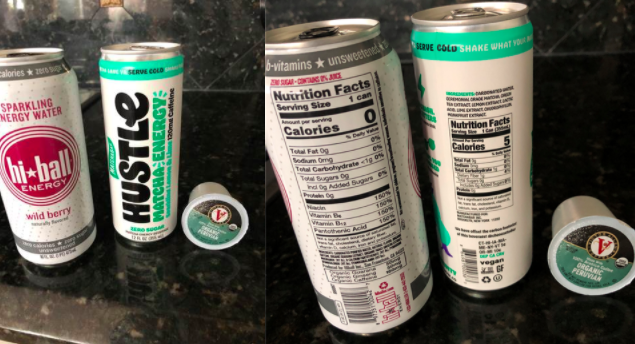
In saying all this, I want to show you what I currently use as natural pre-workout drinks (1 per day in the morning of course, and I cycle through depending on my vibe):
1 cup of coffee
½-1 High Ball drink (caffeine, modest amount of B vitamins, a bit of ginseng)
Hustle Matcha Tea (matcha, green tea, monk fruit for sweetness)
Here are some examples from some fabulous dietitians on the best pre-workout foods:
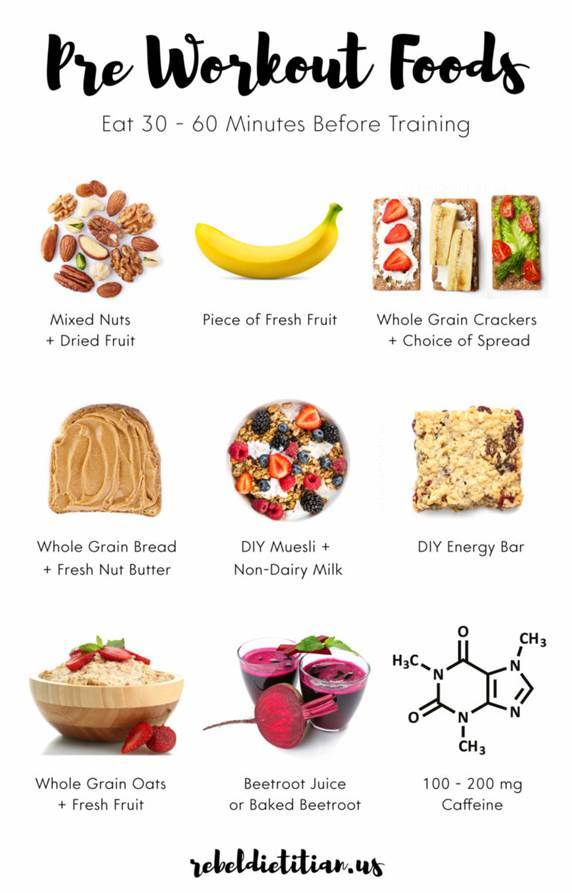
The Best “Natural” Pre-Workout? Duh, Whole Foods
You can find many of the ingredients in pre-workout supplements – the ones that research has shown to improve performance, like caffeine or nitric oxide – in real foods, too. Plus, with those real foods, you also get other essential nutrients.
You know my line now: I recommend a food-first approach for both recreational and elite athletes who are looking to fuel their workouts. Real foods, rather than powders or supplements, are ideal because they offer the best variety of macro and micronutrients, tend to be easiest to digest, and are more palatable.
Keep it simple with a snack one to two hours before a workout, making sure endurance athletes get a heavy serving of carbohydrates and weightlifters get a combo of carbs and protein. Watch the fiber and fat; you’ll digest those more slowly, which could lead to distracting digestive issues when you’re trying to slay during your workout. Not cool.
So Should You Take a Pre-Workout Supplement?
If you’re a recreational exerciser, you probably don’t need a pre-workout supplement. Beet juice, whole-food protein sources, and natural caffeine sources like matcha or coffee can likely provide the benefits you’re looking to achieve when taking a supplement – but without the risk. And of COURSE keep in mind the list of body-balancing we discussed early on in this article (please review again and again).
And here’s a related segment by Studio SWEAT family member Haley (our beloved Eric’s wife) who is a master at sustainability and homeopathic recipes and lifestyle. She inspires me weekly (you simply MUST follow her on Instagram @hippiehappyhaley):
Pink Pre-Workout Smoothie
This simple and tasty smoothie contains two of Miriam’s suggestions – matcha and beet powder.
Ingredients:
- 2 frozen bananas
- 1 teaspoon beetroot powder
- 1/2 teaspoon matcha powder
- 1/2 cup coconut milk (or plant milk of choice)
- 2 pitted medjool dates (optional)
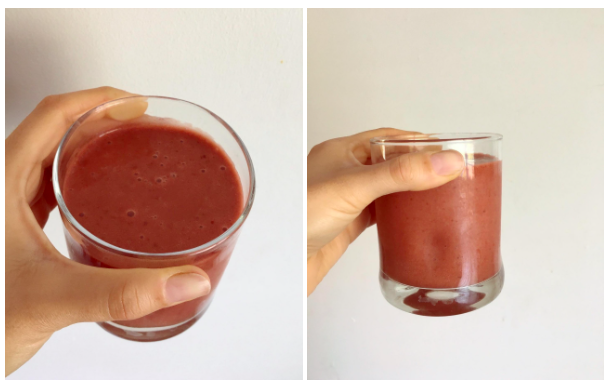
If you do choose to grab a pick-me-up pre-workout, do your research. Do not – if you care about your health – just turn to the product’s website or Amazon page or your trainer’s advice. You really need to put in the time and look into each ingredient to make sure it’s safe, effective, and will improve your performance. And remember my Dad’s old adage: “there’s no such thing as a free lunch.” When in doubt, consult a dietitian. Like, ME! I’m open for business people. 😉
Your trusted source for nutrition information,
Miriam Jirari MPH, RD, CPT, Certified Intuitive Eating Counselor
Studio SWEAT Dietitian

Resources:
- https://www.cambridge.org/core/journals/nutrition-research-reviews/article/nutritional-ergogenic-aids-and-exercise-performance/6199228EEA00AC2F44DDFA365BEE2246
- https://blog.nasm.org/nutrition/ergogenic-foods-performance-health
- https://www.sciencedirect.com/topics/neuroscience/ergogenic-aid#:~:text=Ergogenic%20aids%20are%20mechanical%2C%20nutritional%2C%20pharmacological%2C%20physiological%20and,carnitine%2C%20chromium%2C%20creatine%2C%20ginseng%2C%20glucosamine%20and%20protein%20powders
- https://www.healthline.com/nutrition/pre-workout-supplements#benefits
- https://health.clevelandclinic.org/does-taking-a-pre-workout-actually-work/
- https://www.shape.com/fitness/tips/pre-workout-supplements-for-women-benefits-safety
- https://trendiko.com/natural-alternatives-to-pre-workout-supplements/









Comments - 0